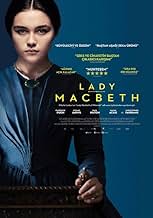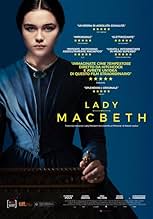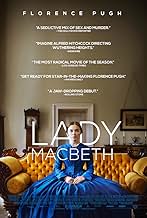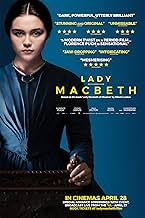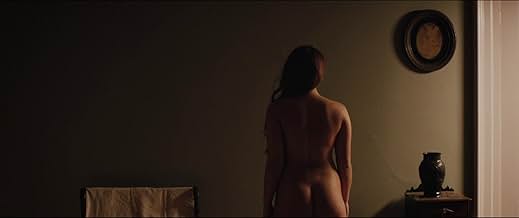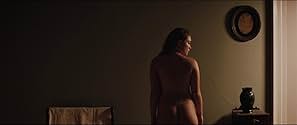En la Inglaterra rural del siglo19, una joven novia a la que han vendido en matrimonio descubre deseos irrefrenables en sí misma cuando se involucra en una aventura romántica con un trabajad... Leer todoEn la Inglaterra rural del siglo19, una joven novia a la que han vendido en matrimonio descubre deseos irrefrenables en sí misma cuando se involucra en una aventura romántica con un trabajador de la finca.En la Inglaterra rural del siglo19, una joven novia a la que han vendido en matrimonio descubre deseos irrefrenables en sí misma cuando se involucra en una aventura romántica con un trabajador de la finca.
- Dirección
- Guionistas
- Elenco
- Nominada a2premios BAFTA
- 24 premios ganados y 58 nominaciones en total
Kema Sikazwe
- Farmhand
- (as Kema Slkazwe)
- Dirección
- Guionistas
- Todo el elenco y el equipo
- Producción, taquilla y más en IMDbPro
Opiniones destacadas
Looking at the title, you might think director William Oldroyd's Lady Macbeth is about revenge, lust, murder, and boredom, and you would be right on all counts. Katherine (Florence Pugh), a 19th century teen bride of an arranged marriage to a middle-aged drunk, can't get no satisfaction. Her husband is impotent for starters, and the estate is so forbidding murder would seem to be a required pastime.
Yet, sex is the prime mover here, where she discovers randy groomsman Sebastian (Cosmo Jarvis), and takes him to bed in the long absence of her hubby. Meek black Anna (Naomi Ackie), Katherine's servant, observes the shenanigans, much as we do, unable to change what she sees will be an outcome unpleasant to the core. To the end Anna is faithful to Katherine, a slave to a mistress who is herself a slave to men and convention.
Several archetypal themes arise in this somber, artfully-photographed drama. For instance, one that emphasizes the wages of sin is prominent; another about the subjugated rising against the oppressor; and another about the danger of socially imprisoning smart women in a paternalistic society. A leitmotif also surfaces about the dangers of debilitating class distinctions, which are never a good thing in the long haul.
Ari Wegner's cinematography is portrait-like if considering only the recurring shot of Katherine sitting on her Victorian couch in a consuming dress that seems to deteriorate with each similar shot. Underneath the dress is the corset, so long a symbol of the era's tight hold on women.
Remembering Amma Asante's Belle, I'm pleased to see another art- film treatment of fraught race relations in merry ol' England. That none of this will ever stop is promised in the spawn of the miscreants, children of evil destined to repeat their parents' sins.
Lady Macbeth is an interesting minimalist story of a smothered young woman, whose intensity will lay waste to the social fabric of the estate. In fact, much of the proceedings are Shakespearean with their emphasis on man's weakness in his dominance, a woman's Eve-like ability to lure men into sin, and the pride that inevitably leads to a fall.
Depressing but dramatically satisfying.
Yet, sex is the prime mover here, where she discovers randy groomsman Sebastian (Cosmo Jarvis), and takes him to bed in the long absence of her hubby. Meek black Anna (Naomi Ackie), Katherine's servant, observes the shenanigans, much as we do, unable to change what she sees will be an outcome unpleasant to the core. To the end Anna is faithful to Katherine, a slave to a mistress who is herself a slave to men and convention.
Several archetypal themes arise in this somber, artfully-photographed drama. For instance, one that emphasizes the wages of sin is prominent; another about the subjugated rising against the oppressor; and another about the danger of socially imprisoning smart women in a paternalistic society. A leitmotif also surfaces about the dangers of debilitating class distinctions, which are never a good thing in the long haul.
Ari Wegner's cinematography is portrait-like if considering only the recurring shot of Katherine sitting on her Victorian couch in a consuming dress that seems to deteriorate with each similar shot. Underneath the dress is the corset, so long a symbol of the era's tight hold on women.
Remembering Amma Asante's Belle, I'm pleased to see another art- film treatment of fraught race relations in merry ol' England. That none of this will ever stop is promised in the spawn of the miscreants, children of evil destined to repeat their parents' sins.
Lady Macbeth is an interesting minimalist story of a smothered young woman, whose intensity will lay waste to the social fabric of the estate. In fact, much of the proceedings are Shakespearean with their emphasis on man's weakness in his dominance, a woman's Eve-like ability to lure men into sin, and the pride that inevitably leads to a fall.
Depressing but dramatically satisfying.
Frances Pugh is the gravitational force of this film; not simply filling the role, but her presence consuming the other characters, the building to which she is confined for most of the film and the shots she inhabits even when silent. In that respect, it's a performance that reminds me of Glenn Close's brilliant turn as the central character in The Wife, a role and film that have more similarities to this than one might first think. That's not to say her performance is greedy - far from it, it has a remarkably understated power; and the rest of the cast act without ego, with great subtlety to all how her to shine in the way in which her role demands. The purpose of the title is only occasionally and vaguely apparent for much of the film, but comes into horrible and brilliant focus in the final act; it's a title the central character earns. But it's the silences that haunt the most and lend this film its creeping power - the background silence of a stately home in the middle of rural northern England; the silence of the house itself; the silence of key characters; and most of all Florence Pugh's silence as she fills the screen, motionless and noiseless in a series of near but not quite identical shots that punctuate the film like refrains, lending a quiet kind of awe to the devastating ending.
"Lady Macbeth" is like a Charlotte Bronte novel if the main heroine were a psychopath.
Florence Pugh plays a young woman saddled with a marriage and an estate that she did not choose for herself, who gets a taste of what it is to give in to her own passionate urges when she shacks up with a hunky stable boy and then decides that she will have a life with him no matter what or who she has to eliminate to make it happen.
"Lady Macbeth" sounds dark and juicy on paper, and it could have been a fabulously lurid spin on the Victorian Gothic template, but as treated here it's far too restrained to take advantage of the pulpy subject matter. The whole film, from the direction to the performances, really needed to go for it and not hold back. Instead, it's too quiet and slow by half, and though Pugh does an admirable job, one can't help but wonder how much more memorable a character she might have been able to create had she been allowed to really go off the rails. Maybe an odd and random thought, but the whole time I was watching this movie I was thinking what a younger Naomi Watts could have done with it.
Not a total misfire, but nowhere nearly as good as it could have been.
Grade: B
Florence Pugh plays a young woman saddled with a marriage and an estate that she did not choose for herself, who gets a taste of what it is to give in to her own passionate urges when she shacks up with a hunky stable boy and then decides that she will have a life with him no matter what or who she has to eliminate to make it happen.
"Lady Macbeth" sounds dark and juicy on paper, and it could have been a fabulously lurid spin on the Victorian Gothic template, but as treated here it's far too restrained to take advantage of the pulpy subject matter. The whole film, from the direction to the performances, really needed to go for it and not hold back. Instead, it's too quiet and slow by half, and though Pugh does an admirable job, one can't help but wonder how much more memorable a character she might have been able to create had she been allowed to really go off the rails. Maybe an odd and random thought, but the whole time I was watching this movie I was thinking what a younger Naomi Watts could have done with it.
Not a total misfire, but nowhere nearly as good as it could have been.
Grade: B
If I were the producer of this film, I'd have chosen a different title. I'm sure lots of moviegoers are going to be misled: this film has nothing to do with Shakespeare. It's an adaptation of a novel by the Russian author Nikolai Leskov, set in early 19th century England.
The film seems to be a pre-feminism manifesto for women's rights. It shows Katherine Lester, the submissive wife of a wealthy but abusive landowner, living in a secluded manor in the British countryside. During a prolonged absence of her husband, she rediscovers her freedom and starts an affair with one of the stable boys. Not willing to give up her newly acquired status, she starts a series of increasingly extreme actions.
The interesting thing is how Katherine evolves from victim to culprit. She seems to have learned from her husband how to use and misuse power. The lack of social conscience of which she at first is a victim, becomes a driving force for her own behaviour. Her selfishness and lack of morality is so extreme that, in the end, she betrays innocent servants. The viewer has to shift his allegiances: at first, it's impossible not to sympathize with Katherine, enjoying a free life without her heartless husband. But halfway through the film, it becomes clear that Katherine is just as heartless, as soon as she is in power.
The story is filmed in a very effective, sober style with beautiful cinematography. The lack of any music is remarkable: some elongated scenes are striking because of the silence. The oppressive atmosphere in the manor is emphasized by the camera work. The camera repeatedly shows scenes from exactly the same viewpoint. Four or five times, we see the servant Anna entering Katherine's bedroom in exactly the same way.
As much as 'Lady Macbeth' is about gender, it is also about class. It is striking that Katherine, who as a woman is considered a lower form of human life by men, herself considers the servants to be a lower form of human life. She shamelessly uses them for her own purposes and enjoyment, but doesn't care at all about their fate afterwards.
'Lady Macbeth' is a beautiful film, about issues that even nowadays are worth thinking about. But I would have named it 'Lust and loneliness' - after all, it's set in the same period as the Jane Austen novels.
The film seems to be a pre-feminism manifesto for women's rights. It shows Katherine Lester, the submissive wife of a wealthy but abusive landowner, living in a secluded manor in the British countryside. During a prolonged absence of her husband, she rediscovers her freedom and starts an affair with one of the stable boys. Not willing to give up her newly acquired status, she starts a series of increasingly extreme actions.
The interesting thing is how Katherine evolves from victim to culprit. She seems to have learned from her husband how to use and misuse power. The lack of social conscience of which she at first is a victim, becomes a driving force for her own behaviour. Her selfishness and lack of morality is so extreme that, in the end, she betrays innocent servants. The viewer has to shift his allegiances: at first, it's impossible not to sympathize with Katherine, enjoying a free life without her heartless husband. But halfway through the film, it becomes clear that Katherine is just as heartless, as soon as she is in power.
The story is filmed in a very effective, sober style with beautiful cinematography. The lack of any music is remarkable: some elongated scenes are striking because of the silence. The oppressive atmosphere in the manor is emphasized by the camera work. The camera repeatedly shows scenes from exactly the same viewpoint. Four or five times, we see the servant Anna entering Katherine's bedroom in exactly the same way.
As much as 'Lady Macbeth' is about gender, it is also about class. It is striking that Katherine, who as a woman is considered a lower form of human life by men, herself considers the servants to be a lower form of human life. She shamelessly uses them for her own purposes and enjoyment, but doesn't care at all about their fate afterwards.
'Lady Macbeth' is a beautiful film, about issues that even nowadays are worth thinking about. But I would have named it 'Lust and loneliness' - after all, it's set in the same period as the Jane Austen novels.
The story starts with a marriage. When the wedding is over, we all expect a romance to accure. Though all we observe is a loveless husband who's going to enslave his woman as a figure in a cage. The powerless lady who had tried to be a devoted compliant wife by obedience, receives no reward in return. Untill this part you've already made your side. You excessively sympathize with the oppressed lady.
But soon after, everything changes. In the absence of her husband, she finds her power and freedom to rule the house. The woman who's been inadequatly satisfied in love and passion, makes an affair with one of his stable workers. The taste of freedom to rule makes her insane to do anything to maintain the condition, even if it means she has to murder someone, has to enslave others or has to sacrifice her love.
The movie indicates how feasible it is for an innocent hunt to be the predator hunter, if they find the moment. The performances of Florence Pugh, Naomi Ackie and Cosmo Jarvis are mesmerizing. Although the script, to put it bluntly, is not perfect, I liked it. All in all, it absolutely worth watching and I recommend you to do so.
But soon after, everything changes. In the absence of her husband, she finds her power and freedom to rule the house. The woman who's been inadequatly satisfied in love and passion, makes an affair with one of his stable workers. The taste of freedom to rule makes her insane to do anything to maintain the condition, even if it means she has to murder someone, has to enslave others or has to sacrifice her love.
The movie indicates how feasible it is for an innocent hunt to be the predator hunter, if they find the moment. The performances of Florence Pugh, Naomi Ackie and Cosmo Jarvis are mesmerizing. Although the script, to put it bluntly, is not perfect, I liked it. All in all, it absolutely worth watching and I recommend you to do so.
¿Sabías que…?
- TriviaFlorence Pugh said she loved her nude scenes in this film. Pugh reflected on her breakout role during an interview for Britain's ES Magazine and admitted the part "changed everything" for her. "I loved the fact she was naked all the time. At that point in my life, I had been made to feel shit about what I looked like and that film was perfect. There was no room for me to feel insecure."
- ErroresA Cornish Rex cat first appears at 14:30. The breed first appeared around 1950.
- ConexionesFeatured in The EE British Academy Film Awards (2018)
- Bandas sonorasPraise to the Lord, the Almighty
(uncredited)
German folk tune
Lyrics by Joachim Neander, translated by Catherine Winkworth
Selecciones populares
Inicia sesión para calificar y agrega a la lista de videos para obtener recomendaciones personalizadas
- How long is Lady Macbeth?Con tecnología de Alexa
Detalles
- Fecha de lanzamiento
- Países de origen
- Sitios oficiales
- Idioma
- También se conoce como
- Леді Макбет
- Locaciones de filmación
- Lambton Castle, Chester-le-Street, County Durham, Inglaterra, Reino Unido(The Lesters' home)
- Productoras
- Ver más créditos de la compañía en IMDbPro
Taquilla
- Presupuesto
- GBP 500,000 (estimado)
- Total en EE. UU. y Canadá
- USD 1,129,408
- Fin de semana de estreno en EE. UU. y Canadá
- USD 64,537
- 16 jul 2017
- Total a nivel mundial
- USD 5,343,632
- Tiempo de ejecución1 hora 29 minutos
- Color
- Relación de aspecto
- 2.39 : 1
Contribuir a esta página
Sugiere una edición o agrega el contenido que falta






